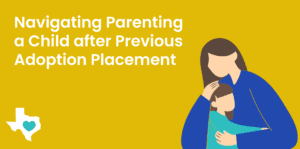
According to the CDC, Texas’ teen birth rate is one of the highest in the nation. In 2018, for instance, over 25,000 teen births occurred in the state. Though pregnancy can cause fear about the future, you’re not alone.
If you are facing an unplanned pregnancy, you’re probably debating what to do next. Deciding whether or not you are ready to raise a child is a big deal. Whether you get guidance from a trusted friend, family member or counselor, or think through the issues yourself, it’s important to be realistic about the challenges of being a teenage parent.
Keep reading to learn about the challenges of teen parenting so you can make an informed decision.
5 Challenges of Being A Teenage Parent
Challenge #1: Difficulty Juggling School with a Child
School is time-consuming. High school students in Texas attend school approximately 7 hours a day. Even more, high school teachers nationwide assign 3.5 hours of work on average.
That means that students taking five academic classes have 10.5 hours of school-related work each day. Of course, this number doesn’t include time for other essential tasks like getting ready for the day and traveling to and from school.
Taking care of an infant is time-consuming, as well. The average infant nurses 8 to 12 times a day for 20-45 minutes. That’s over 2 hours spent feeding each day. In addition, new mothers report exhaustion from waking up multiple times each night. Changing, bathing and playing with a child all take significant time as well.
With all of these activities, most new moms have difficulty concentrating and finding time to rest, let alone do homework.
About 50% of teen moms do not graduate high school or get the equivalent formal education by the time they are 22, and far fewer attend or graduate from college. So, it is important to consider your life goals when thinking about raising a child.
Challenge #2: The Cost of Raising A Child
Infant care comes with large costs. Above, we talked about the time involved in feeding a baby. It’s important to know the financial investment involved as well.
If you use formula exclusively or supplement with formula, you’ll have to budget for this expense. Baby food, which most children begin to eat at 6 months, is another cost to consider. New moms have bottles, diapers, clothes and toys to consider in addition to healthcare costs. An infant requires larger ticket items, such as a crib, highchair, changing table and stroller.
If you go to school or work outside the home, you should know that Texas parents pay an average of $767 each month for infant care, or more than $9,000 a year. These costs can create a heavy financial burden for teen moms who do not have the support of a partner or family members.
Challenge # 3: Change in Social Status
Teen mothers often experience a vast change in their social lives. Some drop out of school to devote time to raising children. Others may stay in school but must drop extracurricular activities or find a job to support their child’s needs.
All of this causes a disconnect from previous social circles. Some girls report that friends maintain contact in the beginning but that friendships change as the new mother’s focus changes. Teen moms often turn down social opportunities to put the needs of the child first.
Still, there are many opportunities in most communities for young mothers to meet. Churches, community centers and social service agencies often have parenting classes or drop-in groups for mothers of infants and toddlers.
Many new mothers often form social relationships for themselves and their children at the park. Aside from motherhood, teen moms have little in common with older—often married—mothers. Though the opportunity for connection is present, teen mothers and older moms do not often have the common ground for deep, lasting relationships.
Bottom line: Your social life will change once you become a parent. Make sure you consider this factor when deciding whether you’re ready to parent.
Challenge #4: The Possibility of Family Conflict
Telling your parents that you are pregnant isn’t easy. Many parents are understandably upset when they learn that their child is pregnant. In the worst-case scenario, parents have kicked their pregnant daughters out of the house without any support.
Even in the best-case scenario, where parents are supportive, family dynamics are likely to change with a new family member. Parents may impose limits on the amount of time and financial support they will give the new mother. She may be asked to move into a different area of the house to accommodate her siblings’ needs or make it more difficult to rely on her parents every time she faces a new challenge.
On the other side of the coin, new mothers may resent parents and siblings whose lives seem more carefree. They may not understand when parents choose not to assist them or babysit every time they ask. They may not feel it is fair to have to abide by any rules or limits now that they are parents themselves.
Since each family is unique, your household changes will be different from that of another teen mom’s. Take time to think about how your relationships with your family members will change if you decide to raise a child in the home.
Challenge #5: Changes to Mental Health
Both becoming a teenager and pregnant are among the risk factors for depression. When these two factors are combined, the risk increases. Only 10-15% of older mothers experience prenatal and postpartum (after delivery) depression, in contrast to 15% to 44% of teens.
There are several causes for mental health changes in teen moms. One reason is that teen moms are more likely to experience pregnancy complications. The added stress of this can impact mental health.
Teen parents do not have the time to devote to exercise, sleep, and self-care that they may have had before giving birth. This can also negatively affect both mood and outlook.
Further, not all teen mothers have the support of their families and friends. This change in their support system can leave teen mothers feeling alone in a challenging situation without caring or guidance.
Find Support at Texas Adoption Center
There are many challenges of being a teen parent, but you don’t have to feel alone at Texas Adoption Center. Our kind and caring adoption specialists will empower you to make the best decision for both you and your baby. Through counseling and education, we’ll provide you with the resources you need.
We would never decide for you but hope to empower you with all the knowledge and tools you need to make the right decision for you and your child.
Contact Texas Adoption Center today for guidance and support. We are here for you.






